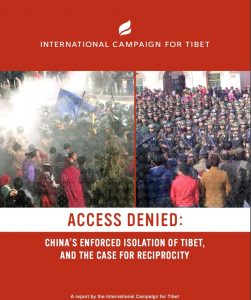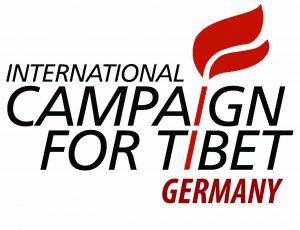 The International Campaign for Tibet (ICT) has released a report calling for reciprocity of access by allowing media and human rights observers into Tibet as well as “an end to policies restricting Tibetan freedom of movement and speech”. It urges “a deeper engagement by governments worldwide on China’s Tibet policy”. The report, Access Denied: China’s enforced isolation of Tibet, and the case for reciprocity, details new policy changes in China focused on increasing control and censorship in Tibet and limiting the mobility of its Tibetan citizens.
The International Campaign for Tibet (ICT) has released a report calling for reciprocity of access by allowing media and human rights observers into Tibet as well as “an end to policies restricting Tibetan freedom of movement and speech”. It urges “a deeper engagement by governments worldwide on China’s Tibet policy”. The report, Access Denied: China’s enforced isolation of Tibet, and the case for reciprocity, details new policy changes in China focused on increasing control and censorship in Tibet and limiting the mobility of its Tibetan citizens.
President of the ICT, Matteo Mecacci, is currently meeting parliamentarians across Europe to discuss the ICT report’s findings and encourage MPs to take action. The first meeting took place in London in the United Kingdom at a round table discussion of the All-Party Parliamentary Group for Tibet (APPGT) on May 9. The discussion focused on finding solutions for the severe restrictions for foreigners wishing to enter Tibet and China’s enforced limitations on Tibetan mobility. Also mentioned was an increase in the dissemination of Chinese propaganda about Tibet to Western countries.
According to the ICT report, over the past ten years there have been three times more Chinese officials sent to the West to “tell the world the story of Tibet in China” than Western government representatives permitted to enter Tibet. Following the 2008 uprisings in Tibet and subsequent crackdown, the Chinese state media declared Lhasa the “happiest city in China”. Without outside journalists and officials gaining access to Tibet, information about events in the Tibet Autonomous Region (TAR) cannot be verified.
Permits to visit Tibet are extremely difficult to obtain. Additionally, each year in March, the month which marks the 1959 Lhasa uprising, the TAR is closed to all tourists. A 2016 article in the Washington Post reported that “the Tibet Autonomous Region […] is harder to visit as a journalist than North Korea.”
Those who do manage to gain access to Tibet are closely supervised. In February 2018, two New York Times journalists were detained in Chinese custody for 17 hours before being expelled from the country. Additionally, as a result of the tighter restrictions for foreigners accessing Tibet, several NGOs have been forced to close.
An additional concern voiced by Matteo Mecacci is that severe restrictions on movement currently in place within the TAR are being expanded to Sichuan, which has a large Tibetan population, and there is concern that in the future this could be rolled out across China.
 The concerns about reciprocity extend to access to news sources. Countries worldwide have access to Chinese news while Chinese citizens face severe restrictions on their access to news sources from outside the PRC and their communication channels are closely monitored. Google, Facebook, WhatsApp, Twitter, Wikipedia and YouTube are all banned in China: the alternatives that are available are all state controlled. Comments posted which relate to protest or those that are derogatory towards the PRC are censored and can result in the authorities personally questioning the comments’ authors.
The concerns about reciprocity extend to access to news sources. Countries worldwide have access to Chinese news while Chinese citizens face severe restrictions on their access to news sources from outside the PRC and their communication channels are closely monitored. Google, Facebook, WhatsApp, Twitter, Wikipedia and YouTube are all banned in China: the alternatives that are available are all state controlled. Comments posted which relate to protest or those that are derogatory towards the PRC are censored and can result in the authorities personally questioning the comments’ authors.
In his meeting with the All-Party Parliamentary Group for Tibet, Matteo Mecacci said, “it is crucial that the principle of reciprocity is implemented not just in terms of trade and the economy, but also in relation to freedom of movement, information and the exchange of peoples.”
In the United States, members of Congress have introduced the Reciprocal Access to Tibet Act of 2017 which calls for reciprocity in freedom of movement by allowing access of “United States officials, journalists, and other citizens to Tibetan areas of the People’s Republic of China”. If United States citizens continue to be prevented from entering the TAR, the bill provides for the US government to restrict entry into the United States for Chinese officials.
Following Matteo Macacci’s meeting in London, a number of NGOs met in private to discuss possible solutions at the UK level. Matteo Macacci is planning a series of meetings with parliamentarians across Europe in the hopes that more countries will introduce similar bills to challenge Chinese restrictions.
The International Campaign for Tibet (ICT) is based in the United States and works to promote human rights and democratic freedoms for the people of Tibet. The Tibet Society in the United Kingdom seeks justice for Tibet through parliamentary lobbying, campaigns and actions.The APPGT is a group of UK MPs with a special interest in Tibet who work closely with the Tibet Society.
Please click here to read the full ICT report.




 Print
Print Email
Email